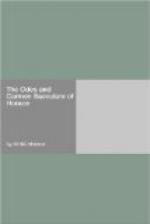Some may consider it extraordinary that in discussing the different ways of representing Horatian metres I have said nothing of transplanting those metres themselves into English. I think, however, that an apology for my silence may he found in the present state of the controversy about the English hexameter. Whatever may be the ultimate fate of that struggling alien—and I confess myself to be one of those who doubt whether he can ever be naturalized—most judges will, I believe, agree that for the present at any rate his case is sufficient to occupy the literary tribunals, and that to raise any discussion on the rights of others of his class would be premature. Practice, after all, is more powerful in such matters than theory; and hardly at any time in the three hundred years during which we have had a formed literature has the introduction of classical lyric measures into English been a practical question. Stanihurst has had many successors in the hexameter; probably he has not had more than one or two in the Asclepiad. The Sapphic, indeed, has been tried repeatedly; but it is an exception which is no exception, the metre thus intruded into our language not being really the Latin Sapphic, but a metre of a different kind, founded on a mistake in the manner of reading the Latin, into which Englishmen naturally fall, and in which, for convenience’ sake, they as naturally persist. The late Mr. Clough, whose efforts in literature were essentially tentative, in form as well as in spirit, and whose loss for that very reason is perhaps of more serious import to English poetry than if, with equal genius, he had possessed a more conservative habit




